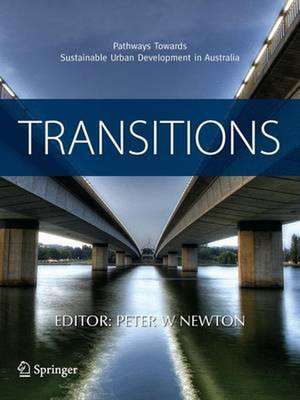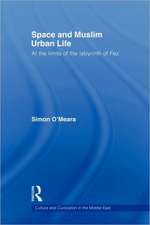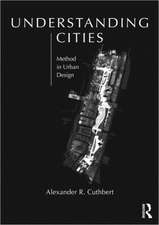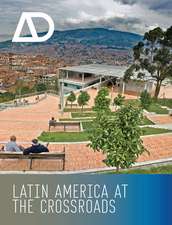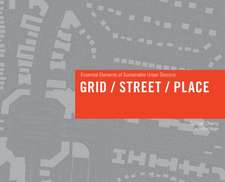Transitions: Pathways Towards Sustainable Urban Development in Australia
Editat de Peter W. Newtonen Limba Engleză Paperback – 2 ian 2013
Transitions identifies 21st century challenges to the resilience of Australia’s cities and regions that flow from a range of global and local influences, and offers a portfolio of solutions to these critical problems and vulnerabilities. The solutions will require fundamental transitions in many instances: to our urban infrastructures, to our institutions and how they plan for the future, and perhaps most of all to ourselves in terms of our lifestyles and consumption patterns.
With contributions from 92 researchers – all leaders in their respective fields – this book offers the expertise to chart pathways for a sustainability transition.
Preț: 1585.83 lei
Preț vechi: 1933.93 lei
-18% Nou
Puncte Express: 2379
Preț estimativ în valută:
303.48€ • 329.54$ • 254.93£
303.48€ • 329.54$ • 254.93£
Carte tipărită la comandă
Livrare economică 22 aprilie-06 mai
Preluare comenzi: 021 569.72.76
Specificații
ISBN-13: 9789048179954
ISBN-10: 9048179955
Pagini: 712
Ilustrații: XX, 692 p.
Dimensiuni: 195 x 260 x 37 mm
Greutate: 1.63 kg
Ediția:2008
Editura: SPRINGER NETHERLANDS
Colecția Springer
Locul publicării:Dordrecht, Netherlands
ISBN-10: 9048179955
Pagini: 712
Ilustrații: XX, 692 p.
Dimensiuni: 195 x 260 x 37 mm
Greutate: 1.63 kg
Ediția:2008
Editura: SPRINGER NETHERLANDS
Colecția Springer
Locul publicării:Dordrecht, Netherlands
Public țintă
ResearchCuprins
From the contents
1. Transitioning to Sustainable Urban Development.- 2. Climate Change.- 3. Resource Consumption and Resource Depletion.- 4. Energy Security, Oil Vulnerability and Cities.- Chapter 5. The Oil Transition and its Implications for Cities.- 6. Globalisation.- 7. Tourism.- 8. Consumers in 2020.- 9. Demographic Transitions.- 10. Future Urban Population and Settlement Transitions.- 11. Metropolitan Evolution.- 12. Sea Level Rise.- 13. Flood.- 14. Drought and High Temperatures.- 15. Bushfire.- 16. Biodiversity.- 17. Biosecurity.- 18. Natural Hazards and Property Loss.- 19. Community Health.- 20. Community Social and Human Capital.- 21. Energy Futures.- 22. Biofuels.- 23. Solar Energy.- 24. Wind Energy.- 25. Hydrogen Energy.- 26. Distributed Energy Systems.- 27. Energy Efficient Housing and Subdivision Design.- 28. Transitions in Transport.- 29. Urban Water Futures.- 30. Integrated Urban Water Management.- 31. Decentralised Water and Wastewater Systems.- 32. The Water Efficient City.
1. Transitioning to Sustainable Urban Development.- 2. Climate Change.- 3. Resource Consumption and Resource Depletion.- 4. Energy Security, Oil Vulnerability and Cities.- Chapter 5. The Oil Transition and its Implications for Cities.- 6. Globalisation.- 7. Tourism.- 8. Consumers in 2020.- 9. Demographic Transitions.- 10. Future Urban Population and Settlement Transitions.- 11. Metropolitan Evolution.- 12. Sea Level Rise.- 13. Flood.- 14. Drought and High Temperatures.- 15. Bushfire.- 16. Biodiversity.- 17. Biosecurity.- 18. Natural Hazards and Property Loss.- 19. Community Health.- 20. Community Social and Human Capital.- 21. Energy Futures.- 22. Biofuels.- 23. Solar Energy.- 24. Wind Energy.- 25. Hydrogen Energy.- 26. Distributed Energy Systems.- 27. Energy Efficient Housing and Subdivision Design.- 28. Transitions in Transport.- 29. Urban Water Futures.- 30. Integrated Urban Water Management.- 31. Decentralised Water and Wastewater Systems.- 32. The Water Efficient City.
Textul de pe ultima copertă
Formidable challenges confront Australia and its human settlements: the mega-metro regions, major and provincial cities, coastal, rural and remote towns. The key drivers of change and major urban vulnerabilities have been identified and principal among them are resource-constraints, such as oil, water, food, skilled labour and materials, and carbon-constraints, linked to climate change and a need to transition to renewable energy, both of which will strongly shape urban development this century.
Transitions identifies 21st century challenges to the resilience of Australia’s cities and regions that flow from a range of global and local influences, and offers a portfolio of solutions to these critical problems and vulnerabilities. The solutions will require fundamental transitions in many instances: to our urban infrastructures, to our institutions and how they plan for the future, and perhaps most of all to ourselves in terms of our lifestyles and consumption patterns.
With contributions from 92 researchers – all leaders in their respective fields – this book offers the expertise to chart pathways for a sustainability transition.
Transitions identifies 21st century challenges to the resilience of Australia’s cities and regions that flow from a range of global and local influences, and offers a portfolio of solutions to these critical problems and vulnerabilities. The solutions will require fundamental transitions in many instances: to our urban infrastructures, to our institutions and how they plan for the future, and perhaps most of all to ourselves in terms of our lifestyles and consumption patterns.
With contributions from 92 researchers – all leaders in their respective fields – this book offers the expertise to chart pathways for a sustainability transition.
Caracteristici
In-depth introduction to important social and political issues around the future of city planning for the next generation Explication of the global forces that will be prime shapers of Australia’s 21st century urban development: climate change, access to resources (oil), globalisation of industry, capital and population movements How the relative attractiveness of destination regions in Australia will shape population movement and settlement growth
